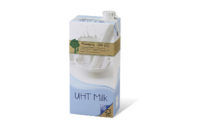

The global food industry is now also looking into processing technologies and packaging solutions that are specifically geared towards maintaining product quality and that offer logistical advantages. Aseptic filling technology in conjunction with aseptic carton packs is part of this move forward.
When it comes to food, consumers want products to be tasty and healthy and at the same time practical. Consequently, the aspects “health and wellness” and “on-the-go consumption” are among the main drivers in the drinks industry, providing direction for the development for new product concepts. For many consumers, the pace of day-to-day life is now faster, more active and more hectic than ever. People are often in a hurry, rushing from one appointment to the next, eating and drinking when they get the chance − not at fixed times, but whenever they can fit a quick bite into their daily routine. Snacking is a booming business.
For many people, the flip side of this modern nomadism is a growing body consciousness. Health and wellness are aspects that have an impact on leisure time activities and food choices. As a result, product concepts that address the issues of vitality, fitness and indulgence and that are made from pure, natural ingredients are well received by modern consumers.
In this respect, smoothies suit the tastes and meet the demands of consumers. Although there is no global definition of what makes a “real” smoothie, there are characteristic features that are generally accepted as constituting a smoothie. In the non-carbonated soft drink sector, they are at the top end of the premium products range, with whole, high-quality fruits processed into creamy mixed fruit purées. This gives smoothies extremely high vitamin content. No sugar, colorants, preservatives or other additives are included.
“Smoothies are healthy,” says Norman Gierow, market segment manager for non-carbonated soft drinks at SIG Combibloc. “They are made from top-quality, natural ingredients and have a rich, smooth consistency. In the emerging smoothies market segment, it can be seen that product innovations have a particularly positive start in the market if they come with an appealing, holistic product concept and reach the consumer through an appropriately positioned pitch.”
In Great Britain, fruit-based smoothies are already a success. The market is growing in Western Europe and North America, too, and a huge variety of new product concepts is expanding the range of the creations available. New markets for smoothies are opening up in parts of Eastern Europe. Asia and Australia also offer opportunities for success in the smoothies market, in terms of sales volumes and the margins for food manufacturers.
“Smoothies have the potential, if they are optimally positioned, to pull in profitable margins,” Gierow says. “At the same time, these premium foods entail sales risks. Sold as fresh products, smoothies need to be distributed and presented within a closed cold chain system. Rapid deterioration in quality and changes in flavor in these highly sensitive products can be significantly minimized by using a gentle aseptic process to fill the products into carton packs.”
This filling technology and the features of the carton packaging are of particular interest in market regions where a closed cold chain is unfeasible. Gently packaged in aseptic carton packs, premium smoothies are safely protected and can be transported and stored in a space-saving manner without refrigeration or preservatives. The quality of the nutritious ingredients in the product is retained. According to Gierow, this means smoothies packaged in carton packs also offer very clear benefits in terms of reducing energy consumption and transport costs and minimizing CO2 emissions.
The aseptic carton pack is made from cardboard, polyethylene and aluminum. At 75% the main constituent of the composite, the primary function of the cardboard is to give the carton pack stability. The polyethylene layers (21%) form liquid barriers. Aluminum (4 per cent) protects the packaged food from light and oxygen. This combination of features retains the quality of the products.
By choosing to buy foods in carton packs, consumers can make an active contribution to climate protection. According to a life cycle assessment conducted by the Institute für Energie- und Umweltforschung (IFEU/Institute for Energy and Environmental Research), aseptic carton packs have significantly less impact on the greenhouse effect than do disposable bottles manufactured from PET, whose primary raw material is crude oil. Compared to carton packs, disposable bottles use around double the quantity of fossil fuels, and over the same product lifetime (manufacture, processing, transport, disposal etc) they generate up to three times more gases that are harmful to the environment.
The naturalness aspect of smoothie and packaging can be ideally communicated, for instance, to LOHAS (Lifestyle of Health and Sustainability). For the LOHAS group, informed consumption is one of the key reasons for buying a product. Consumers in this group make close links between product choices and their own personal enjoyment, and moral concepts of health and sustainability.
For this reason, according to Gierow, a fruity, natural smoothie in a recyclable carton pack, manufactured predominantly from renewable raw materials, is the perfect vehicle to specifically address this target group.
Gierow advises: “The benefits in favor of filling smoothies in aseptic carton packs are significant. A key issue for food manufacturers and retailers is to use a convincing overall concept to highlight these aspects in the product positioning, and then present them at point of sale.”
Particularly for the retail market, smoothies in aseptic carton packs allow flexible options for presentation. To underscore their premium quality character, the products can also be presented, for instance, in the chilled cabinet. But even without refrigeration, the premium product quality is retained.
A glance at the latest new products to appear over the past few months shows that in the smoothies sector, the range of products on offer is expanding. In the future, smoothies will no longer be sold only as branded products, but will also appear under the private labels of major retail chains. In addition, it is anticipated that more and more multinational companies will be entering the smoothie business, thereby reaching more and more consumers.
For food manufacturers, in the future it will be all the more important to differentiate their smoothies from competing products by using new, creative variants to achieve the highest possible market margins. Differentiation can be generated, for instance, by developing new flavors, or by offering the added-value features that can be obtained by adding “superfruits” such as pomegranates, açai or cranberries to the product.
In terms of expanding the smoothie product concept, there is still plenty of scope for future innovations. The naturalness of a smoothie can be further emphasized, for example, by adding pieces of fruits such as mango, peach or pineapple.
Gierow sees a major opportunity here to allow consumers to experience naturalness: “Whether it is pieces of fruit, vegetables or cereal grains, the flexible filling technology of SIG Combibloc opens the way for the types of product concept that combine drinks and pieces of fruit, vegetables or other natural ingredients to create an incomparable whole. These little power packs are an aid to balanced nutrition and create new, super-healthy taste experiences.”
SIG Combibloc Inc.
www.sig.biz

